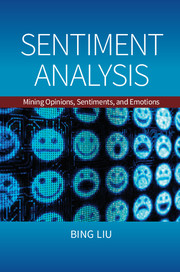Book contents
- Frontmatter
- Contents
- Preface
- Acknowledgments
- 1 Introduction
- 2 The Problem of Sentiment Analysis
- 3 Document Sentiment Classification
- 4 Sentence Subjectivity and Sentiment Classification
- 5 Aspect Sentiment Classification
- 6 Aspect and Entity Extraction
- 7 Sentiment Lexicon Generation
- 8 Analysis of Comparative Opinions
- 9 Opinion Summarization and Search
- 10 Analysis of Debates and Comments
- 11 Mining Intentions
- 12 Detecting Fake or Deceptive Opinions
- 13 Quality of Reviews
- 14 Conclusions
- Appendix
- Bibliography
- Index
14 - Conclusions
Published online by Cambridge University Press: 05 June 2015
- Frontmatter
- Contents
- Preface
- Acknowledgments
- 1 Introduction
- 2 The Problem of Sentiment Analysis
- 3 Document Sentiment Classification
- 4 Sentence Subjectivity and Sentiment Classification
- 5 Aspect Sentiment Classification
- 6 Aspect and Entity Extraction
- 7 Sentiment Lexicon Generation
- 8 Analysis of Comparative Opinions
- 9 Opinion Summarization and Search
- 10 Analysis of Debates and Comments
- 11 Mining Intentions
- 12 Detecting Fake or Deceptive Opinions
- 13 Quality of Reviews
- 14 Conclusions
- Appendix
- Bibliography
- Index
Summary
This book introduced the field of sentiment analysis or opinion mining. It presented some basic knowledge and mature techniques in detail and surveyed numerous other state-of-the-art algorithms. Owing to numerous challenging research problems and a wide variety of practical applications, sentiment analysis has been a very active research area in several computer science fields, for example, NLP, data mining, web mining, and information retrieval. It has also spread to management science (Hu et al., 2006; Archak et al., 2007; Das and Chen, 2007; Dellarocas et al., 2007; Ghose et al., 2007; Park et al., 2007; Chen and Xie, 2008) and other social science fields such as communications and political science because of its importance to business and society as a whole. With the rapid expansion of social media on the web, the importance of sentiment analysis is also growing by the day.
In the book, I first defined the problem of sentiment analysis (Chapter 2), which provides a common framework to unify different research directions and research problems in the area. It also presents a schema to convert unstructured free text to structured data, which facilitates qualitative and quantitative analysis of opinions. I then discussed the widely studied problem of document-level sentiment classification (Chapter 3), which aims to determine whether an opinion document (e.g., a product review) expresses a positive or a negative sentiment. This was followed by Chapter 4 on sentence-level subjectivity and sentiment classification. These tasks determine whether a sentence is opinionated, and if opinionated, whether it carries a positive or negative opinion. Chapters 5 and 6 focused on aspect-based sentiment analysis, which employs the full problem definition in Chapter 2. They also showed that sentiment analysis is a multifaceted problem with multiple challenging subproblems. The existing techniques for dealing with these problems were also presented. Due to a large amount of information, this topic was covered in two chapters. Chapter 5 was dedicated to the task of aspect-based sentiment classification, and Chapter 6 was devoted to the task of opinion target extraction, which includes the extraction of entities and their aspects.
Information
- Type
- Chapter
- Information
- Sentiment AnalysisMining Opinions, Sentiments, and Emotions, pp. 309 - 314Publisher: Cambridge University PressPrint publication year: 2015
